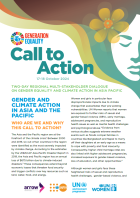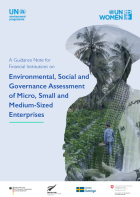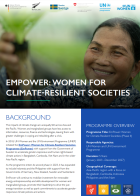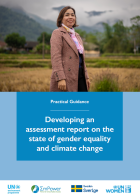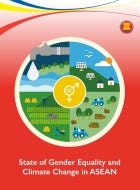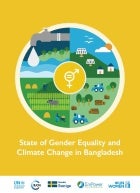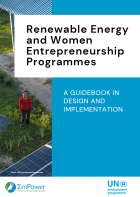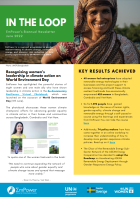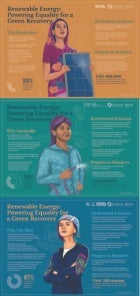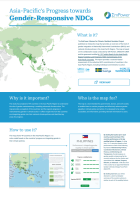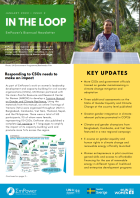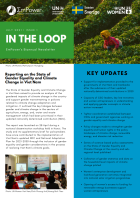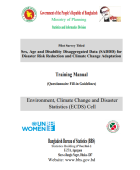1 - 20 of 28 Results
Pagination
Date:
With USD 150,000 in annual revenue generated and significant reductions in labor time and carbon emissions, the project is a model for integrating economic empowerment and environmental sustainability.
Date:
This Call to Action reflects our commitment to a sustainable and resilient future for Asia and the Pacific, highlighting that the theme of the 29th Session of the UNFCCC Conference of Parties, “In Solidarity for a Green World” cannot be realized without including diverse voices from the region’s most vulnerable to climate impacts.
Date:
As part of the “EmPower: Women for Climate- Resilient Societies Programme Phase II (2023-2027)”, the United Nations Environment Programme (UNEP) and the United Nations Entity on Gender Equality and the Empowerment of Women (UN Women) are partnering with regional and/or local financial institutions in target countries (Bangladesh, Cambodia, Indonesia, Philippines and Viet Nam).
Date:
The transformation of societies and economies towards paradigms centred on interdependence, care, and sustainability is urgently needed.
Date:
The impacts of climate change, environmental degradation and disasters are unequally felt across Asia and the Pacific region. Women and marginalized groups have less access to information, resources, finance and technologies, leaving them with greater challenges in coping and rebuilding after a crisis.
Date:
This practical guidance document was developed for stakeholders wishing to conduct an assessment of gender equality and climate change, to meet the critical need for data on the gender-environment nexus and ensure that climate action contributes towards achieving gender equality.
Date:
This report takes stock of the ongoing experiences related to gender-responsive renewable energy programmes as well as the consolidated wealth of knowledge and lessons learned in this field.
Date:
The regional flagship report, State of Gender Equality and Climate Change in ASEAN, analyzes the gendered impacts of climate change in the Southeast Asia and suggests ways to enhance and mainstream gender equality into climate-relevant sectoral policies and actions.
Date:
The report aims to strengthen country-driven processes by presenting more evidence of the links between gender equality and climate change in the priority sectors of crop agriculture, water resource management, forestry, and renewable energy.
Date:
This Guidebook has been developed by the UN Environment Programme (UNEP) to serve as a user-friendly tool for institutions, project developers and practitioners to plan, design and implement renewable energy-based women entrepreneurship projects, as well as for donors interested in funding the same.
Date:
The role of the energy-gender nexus in accelerating renewable energy (RE) deployment in ASEAN remains underexplored. Current gender disparities severely impede the enhancement of women’s roles and opportunities in the renewable energy sector, and hinder women’s contributions to the energy transition.
Date:
This issue of EmPower's biannual newsletter covers highlights from the first half of 2022 and features links to a collection of resources for our work on gender equality and climate change.
Date:
Funded by the Swedish International Development Agency, the EmPower project aims to contribute to the implementation of climate change and disaster risk reduction actions in Asia and the Pacific that address the key drivers of gender-based vulnerabilities while enhancing human rights.
Date:
Infographics and videos on Renewable Energy: Powering Equality for a Green Recovery. Three women leaders from Bangladesh, Cambodia, and Viet Nam.
Date:
The EmPower: Women for Climate- Resilient Societies Project published an interactive map that provides an overview of the level of gender integration in Nationally Determined Contributions (NDCs) and national climate policies in the Asia-Pacific Region. Check how to guide the NCD Map.
Date:
Read up on all the progress achieved by the EmPower programme as we continue our journey towards building more inclusive and climate-resilient societies in the Asia-Pacific region.
Date:
Read up on all the progress achieved by the EmPower programme as we continue our journey towards building more inclusive and climate-resilient societies in the Asia-Pacific region.
Date:
This enumerator’s training manual was developed by the Bangladesh Bureau of Statistics (BBS), the implementation partner of the EmPower project in Bangladesh for SADDD collection, to support the rollout of the survey.
Date:
The purpose of this guide is to introduce and improve the integration of gender issues in renewable energy policies, plans and strategies by providing practical ways to step up commitments in renewable energy policy in an inclusive and gender responsive way.
Date:
The EmPower: Women for Climate-Resilient Societies project, jointly implemented by the United Nations Environment Programme (UNEP) and UN Women and kindly supported by the Swedish Development Cooperation Agency, puts gender equality at the heart of climate action.

![[cover]](/sites/default/files/styles/search_image_140px/public/2025-01/af-c1424-unw_wee_b30_climate-960px.jpg?itok=JLbT5Yvi)
